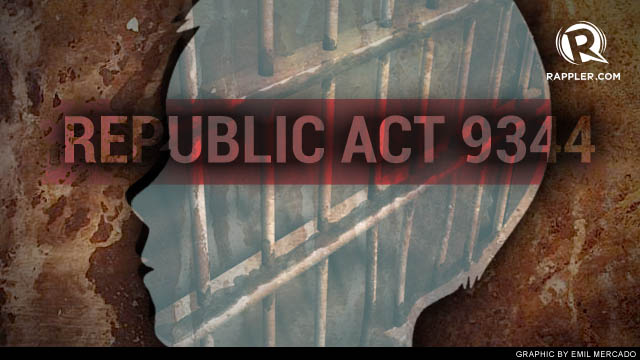SUMMARY
This is AI generated summarization, which may have errors. For context, always refer to the full article.

MANILA, Philippines – The proposed amendments to the Juvenile Justice and Welfare Act is on its way to being enforced, but the age of criminal responsibility, after debates to lower it, will remain at 15.
The Senate and the House of Representatives ratified the bicameral conference committee report on House Bill 6042 and Senate Bill 3324 on Wednesday, June 5, the second to the last session day of the 15th Congress.
The bill, which seeks to amend Republic Act 9344 or the Juvenile Justice Act passed in 2006, now awaits the signature of the President.
The Senate and the House initially clashed on the age of criminal responsibility, with congressmen wanting to lower the age of criminal liability to 12 years old from 15. In the end, lawmakers agreed to retain the age of criminal liability at 15, in keeping with international standards, during the bicameral conference committee session on May 28.
Other amendments introduced to the law include:
1) Children aged 12 to 15 who commit heinous crimes or repeatedly violate the law be subject to a community-based intervention program.
2) The Department of Social Welfare and Development (DSWD) becomes the lead agency that will implement the law. It was originally the Department of Justice.
3) Those who use children to aid them in criminal acts will face the maximum punishment for the crime committed by the children.
4) Funds were allocated to construct Bahay Pag-asa in different parts of the country, especially in areas where there is high incidence of children in conflict with the law.
The bill aims to protect the welfare of children in conflict with the law, most of whom are guilty of petty crimes like theft, vagrancy, and sniffing glue.
“We also allocated funds in the law for the construction of Bahay Pag-asa in different parts of the country because this has been the problem, there is no facility for children in conflict with the law that is why they are just set free,” Sen Francis Escudero, chairman of the Senate justice committee, said in an interview last week.
“Here, under the bill, we allocate specific funds for the construction of Bahay Pag-asa, especially in places with high incidence of children in conflict with the law.”
Escudero explained that repeat offenders who already underwent rehabilitation can be involuntarily committed to a facility through a petition by the DSWD or the child’s parents.
“While it is the state’s primary responsibility to ensure that children are led in the right path, it is a joint responsibility of the parents and the state,” Escudero added.
He added that criminals using children to violate the law face maximum penalty.
As for children aged 15 to 18, they can face charges if it is proven that they are capable of “discernment in accordance with existing law.”
The bill amends a 2006 law, under which children in conflict with the law are provided with intervention programs. Prior to the enactment of the original law, they were thrown into the same prison cells as hardened criminals. – Rappler.com
Add a comment
How does this make you feel?
There are no comments yet. Add your comment to start the conversation.